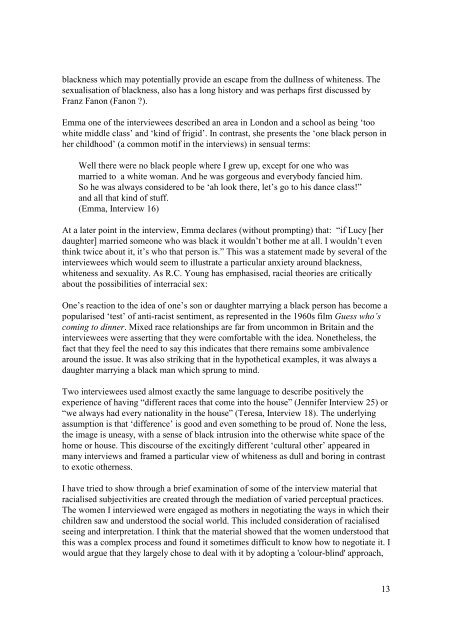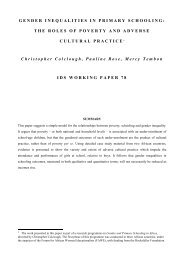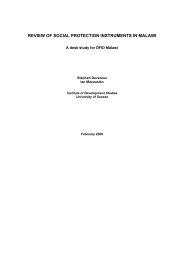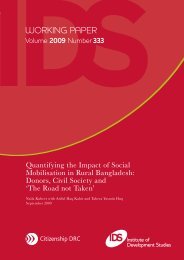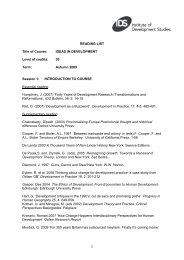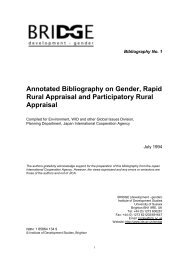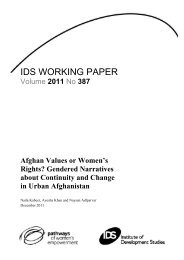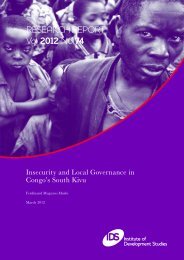1 'Troubling race. Using Judith Butler's work to think about racialised ...
1 'Troubling race. Using Judith Butler's work to think about racialised ...
1 'Troubling race. Using Judith Butler's work to think about racialised ...
You also want an ePaper? Increase the reach of your titles
YUMPU automatically turns print PDFs into web optimized ePapers that Google loves.
lackness which may potentially provide an escape from the dullness of whiteness. The<br />
sexualisation of blackness, also has a long his<strong>to</strong>ry and was perhaps first discussed by<br />
Franz Fanon (Fanon ?).<br />
Emma one of the interviewees described an area in London and a school as being ‘<strong>to</strong>o<br />
white middle class’ and ‘kind of frigid’. In contrast, she presents the ‘one black person in<br />
her childhood’ (a common motif in the interviews) in sensual terms:<br />
Well there were no black people where I grew up, except for one who was<br />
married <strong>to</strong> a white woman. And he was gorgeous and everybody fancied him.<br />
So he was always considered <strong>to</strong> be ‘ah look there, let’s go <strong>to</strong> his dance class!”<br />
and all that kind of stuff.<br />
(Emma, Interview 16)<br />
At a later point in the interview, Emma declares (without prompting) that: “if Lucy [her<br />
daughter] married someone who was black it wouldn’t bother me at all. I wouldn’t even<br />
<strong>think</strong> twice <strong>about</strong> it, it’s who that person is.” This was a statement made by several of the<br />
interviewees which would seem <strong>to</strong> illustrate a particular anxiety around blackness,<br />
whiteness and sexuality. As R.C. Young has emphasised, racial theories are critically<br />
<strong>about</strong> the possibilities of interracial sex:<br />
One’s reaction <strong>to</strong> the idea of one’s son or daughter marrying a black person has become a<br />
popularised ‘test’ of anti-racist sentiment, as represented in the 1960s film Guess who’s<br />
coming <strong>to</strong> dinner. Mixed <strong>race</strong> relationships are far from uncommon in Britain and the<br />
interviewees were asserting that they were comfortable with the idea. Nonetheless, the<br />
fact that they feel the need <strong>to</strong> say this indicates that there remains some ambivalence<br />
around the issue. It was also striking that in the hypothetical examples, it was always a<br />
daughter marrying a black man which sprung <strong>to</strong> mind.<br />
Two interviewees used almost exactly the same language <strong>to</strong> describe positively the<br />
experience of having “different <strong>race</strong>s that come in<strong>to</strong> the house” (Jennifer Interview 25) or<br />
“we always had every nationality in the house” (Teresa, Interview 18). The underlying<br />
assumption is that ‘difference’ is good and even something <strong>to</strong> be proud of. None the less,<br />
the image is uneasy, with a sense of black intrusion in<strong>to</strong> the otherwise white space of the<br />
home or house. This discourse of the excitingly different ‘cultural other’ appeared in<br />
many interviews and framed a particular view of whiteness as dull and boring in contrast<br />
<strong>to</strong> exotic otherness.<br />
I have tried <strong>to</strong> show through a brief examination of some of the interview material that<br />
<strong>racialised</strong> subjectivities are created through the mediation of varied perceptual practices.<br />
The women I interviewed were engaged as mothers in negotiating the ways in which their<br />
children saw and unders<strong>to</strong>od the social world. This included consideration of <strong>racialised</strong><br />
seeing and interpretation. I <strong>think</strong> that the material showed that the women unders<strong>to</strong>od that<br />
this was a complex process and found it sometimes difficult <strong>to</strong> know how <strong>to</strong> negotiate it. I<br />
would argue that they largely chose <strong>to</strong> deal with it by adopting a 'colour-blind' approach,<br />
13


